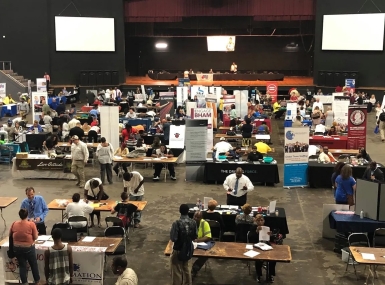Short-term rentals pit tourism against residents

Counties balance tourism industry and residents' wishes in regulating short-term rentals like Airbnb, HomeAway
When the El Dorado County, Calif. Board of Supervisors met one night a few months ago, the room was so packed it was shut down by the fire marshal. What brought so many people out? Citizens concerned about short-term vacation rentals in the popular tourist area in the South Lake Tahoe region.
With the summer vacation season just around the corner, many counties are gearing up for an influx of tourists, many of whom will “Airbnb” it in residential neighborhoods instead of staying at a local hotel, motel or inn. Counties often walk a fine line trying to keep local businesses happy as they cater to tourists (property managers, cleaning services, grocery stores, restaurants, rental companies and ski resorts) while also keeping the peace with residents who aren’t as welcoming to tourists coming and going next door.
“This is part of living in a tourist area, it’s definitely a balancing act,” said El Dorado County Supervisor Sue Novasel. “You have to be careful, if you put the hammer down too hard, people are offended, they think you don’t want them here and that’s not the case. We want people to understand El Dorado County is open for business and that tourism is our biggest business. We want peaceful neighborhoods but we understand the tourism market has changed.”
County News took a look at how counties that attract tourists are dealing with short-term rentals while keeping the local economy humming.
Local ordinance says no hot-tubbing after 10 p.m.
Like many tourism areas around the country, El Dorado County is trying to keep both residents and tourism businesses happy. It’s doing that by exploring possible ordinances that lay out the rules for home rental hosts and guests.
While the area attracts upwards of 3 million tourists per year, keeping the local economy going, residents in the region are pushing back and have banded together to form the Tahoe Neighborhoods Group to stem what they see as a trend that is hurting their sense of community.
The county is listening to residents and considering possible ordinances including those in South Lake Tahoe which is cracking down, handing out $1,000 tickets to visitors who don’t park in the garage, driveway or immediately in front of the property (in some cases, it’s a $2,000 fine — one ticket for the visitor and another ticket to the homeowner, who often passes it along to the visitor). Other infractions for visitors include those related to noise, trash, too many visitors or hot-tubbing after 10 p.m.
Infractions could add up to even more severe penalties. Vacation home owners who receive three upheld violations within 24 months lose their short-term rental permit — permanently.
On the other side of the coin, the tourism industry, led by the Lake Tahoe South Shore Chamber of Commerce, is contemplating backing a competing measure to protect what they call “our economy.” They, too, have banded together, forming a group called Sustainable Community Alliance.
Clark County, Nev.
Clark County, Nev. commissioners voted in September to pursue a lawsuit against a company that continued to rent out a home even after receiving four cease-and-desist letters. County Code Enforcement Chief Jim Andersen hopes to introduce a new ordinance allowing his officers to issue citations and fines without first going to court. Currently the county is imposing liens on homes of offenders.
The officers investigate short-term rental complaints every weekend.
In Arlington County, Va., the county is looking to a third-party vendor to track down hosts who haven’t bothered to register with the county since it enacted a new ordinance regulating short-term rentals, said Benjamin Hampton, a spokesman in the county manager’s office. Out of 1,600 short-term rentals found online, only 140 have actually registered with the county. The county is now sending out letters to let hosts know they need to register, he said.
Some neighborhoods are taking enforcement into their own hands. In San Diego County, Calif., the second most popular area for Airbnb guests in California, home owner associations are hiring private investigators to catch homeowners who are violating HOA bylaws that prohibit turning units into short-term vacation rentals.
Neighborhoods can opt out of short-term rentals, for a price, in Sonoma County, Calif. The county itself set aside “exclusion zones” for certain neighborhoods in 2016. Since then, other neighborhoods have applied to prevent short-term rentals on their streets too. In March, the county approved the first “X-zone” permit for about a dozen applicants who live along a three-mile road who had started the process two years ago. The group had to pay for a zone change ($5,582) plus pay for Permit Sonoma staff time at $140 an hour for a grand total of close to $11,000. County officials are looking into how to make the process less expensive.
In Davidson County, Tenn., in the Nashville area, no more than 3 percent of the single-family and two-family units within each census tract are permitted as non-owner-occupied short-term rental use. Anyone who wants to see if there is availability can plug an address into an online map. In Davidson County, owners must obtain an operating permit, must pay hotel occupancy taxes and sales tax. They must also obtain a business tax license if they are grossing more than $10,000 per year.
Collecting taxes on short-term rentals
Across the country, some counties are making sure that anyone renting their home for short-term stays are paying a hotel or “bed” tax.
Lancaster County, Pa. refused to sign an agreement with Airbnb that would have allowed hosts to skip the registration process, saying that it would hinder the ability of officials to collect the county’s 3.9 percent hotel room rental tax and 1.1 percent hotel excise tax.
The hotel industry is also getting into home rentals and is calling on counties to reject “voluntary” collection agreements for sales and bed taxes, arguing that a mandatory agreement would level the playing field.
Floyd County, Ga., collected more than $100,000 in lodging taxes last year but is contracting with a company to go after hosts who aren’t paying their fair share. “There are a lot that show up online and aren’t actually registered with the county and aren’t paying the tax, which is required by law,” said Floyd County Commissioner Rhonda Wallace. “We aren’t trying to get anyone in trouble, we just want everybody to be aware of what the law requires you to do if you are allowing people to stay in your home and you are charging, you should be paying that tax. That’s why we got that consultant; they can talk with them about it.”
The third-party company hired by the county looks at property records and online activity to determine if all taxes are being paid. If someone has not been collecting and submitting taxes, the company will educate them about the requirements.
Tourism is a key driver for Floyd County, especially Forum River Center, which is used for conventions and concerts, and Rome Tennis Center which features 60 tennis courts at Berry College, Wallace said. The lodging taxes are used for tourism activities in the county including maintenance and operation of the tennis center.
In Florida, Airbnb collects and remits taxes in 40 counties. Not every county is quick to sign on with Airbnb. In January, Collier County, Fla. sued the online rental retailer seeking a court order for the company to pay current and past bed taxes. The county is hoping to receive a list of hosts, but Airbnb has said it doesn’t share that information, the Naples Daily News reported. Many counties create a host registry system.
Short-term rental hosts in Florida earned $450 million in 2017. Miami-Dade, Broward and Osceola were tops at $135 million; $46 million and $40 million.
Fairfax County, Va.
Virginia passed a law last year that allows localities to regulate short-term rentals. Just outside of Washington, D.C. Fairfax County is a popular spot for short-term rentals even though they are not technically legal yet.
“Before the General Assembly gave us that authority, we really only were managing these through our building codes and zoning ordinances,” said Fairfax County Supervisor Jeff McKay. “What we found through public hearings is that people want these [short-term rentals]. This isn’t an attempt to outlaw them at all. We want to regulate them.”
Last year, county supervisors directed the county to create a working group made up of Planning and Zoning, Tax Administration and Code Compliance and the Office of the County Attorney to draft new regulations and establish a registry.
“We’re definitely wanting to allow these but we want to know where they are, it makes code enforcement or when someone calls in a complaint, it makes it a whole lot easier,” McKay said.
HOA rules “always supersede” county ordinances, McKay said. A problem might come about if an HOA can’t meet requirements to change their bylaws.
Fairfax County’s planning commission will hold a hearing in May and a Board of Supervisors hearing is set for June. The hearings follow four community center meetings as well as an online survey that has received more than 5,000 responses.
The county could collect nearly $500,000 in additional transient-occupancy tax revenue as well as another $150,000 from permit fees.
Attachments
Related News

Counties offer a second chance after incarceration
From job fairs and housing programs to educational opportunities, counties offer a second chance after incarceration.

County shines light on property deed history of racially restrictive covenants
The Durham County, N.C. Register of Deeds is using public records information and archival documentation to educate county residents on racially restrictive covenants in property deeds and how their impact can still be felt today.

